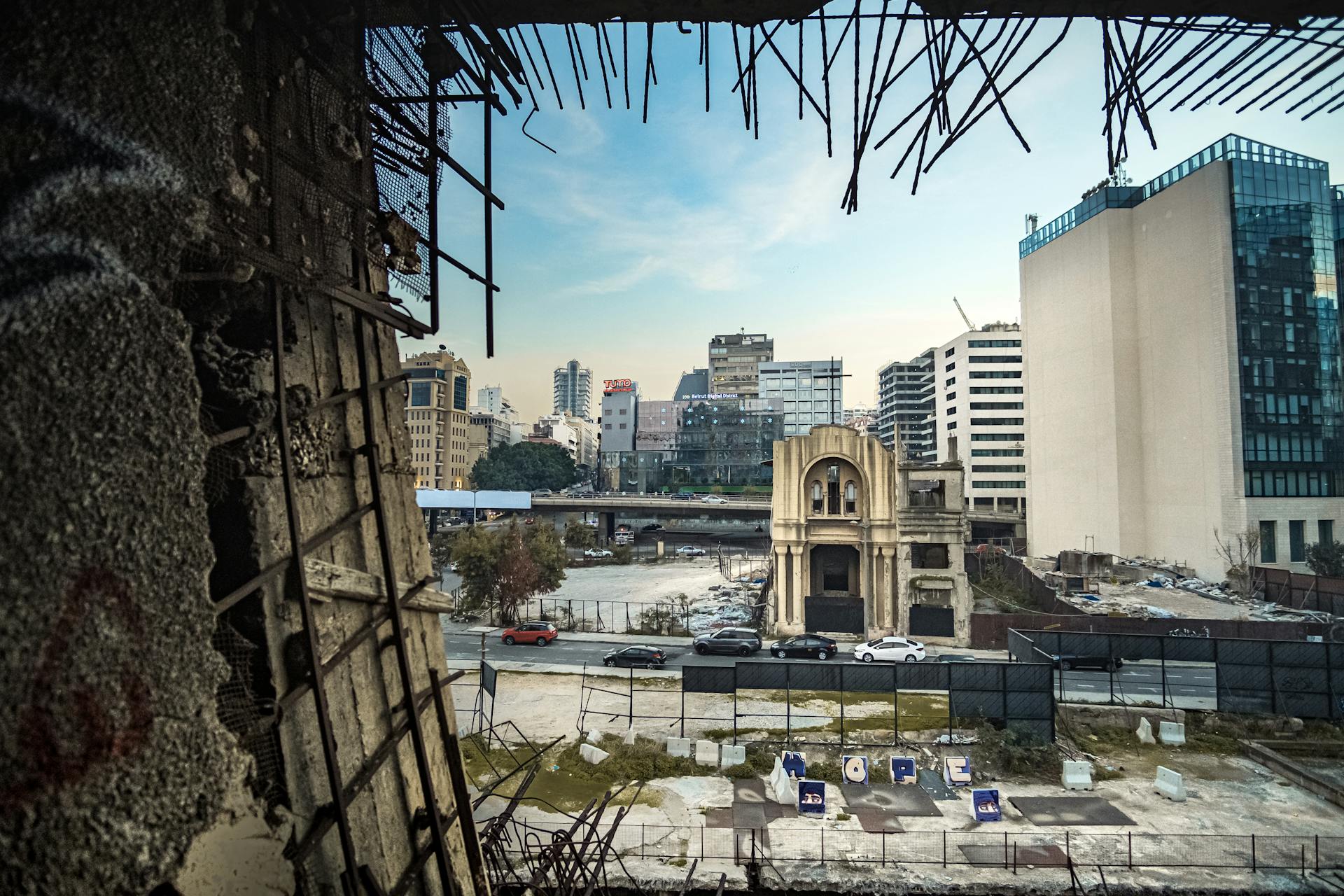
The Central Bank of Lebanon, also known as Banque du Liban, is the country's central bank and monetary authority.
It is responsible for regulating the country's monetary policy, maintaining financial stability, and overseeing banking operations.
The bank's headquarters are located in Beirut, Lebanon's capital city.
The Central Bank of Lebanon is governed by a Board of Directors, which is responsible for setting the bank's overall direction and strategy.
Here's an interesting read: Maldives Monetary Authority
Central Bank of Lebanon: Governance and Oversight
The Banque du Liban, Lebanon's central bank, has a robust governance structure in place. The Governor, who is always a Maronite Christian, is the legal representative of the bank and has extensive authority over its management.
The Governor is assisted by four vice governors, who are appointed by decree for a renewable five-year term. These vice governors help the Governor in managing the bank and carrying out functions specified by them. They also assume their duties as members of the Central Council.
Related reading: Head of Turkish Central Bank
The Central Council, which is the highest decision-making body of the Banque du Liban, is composed of key officials, including the Governor, the four vice governors, the Director General of the Ministry of Finance, and the Director General of the Ministry of Economy and Trade.
The Central Council is responsible for setting monetary and credit policies, including money supply, discount, and lending rates. It also decides on issues concerning the banking and financial sectors, the establishment of clearinghouses, and the issuing of currency and loan requests by public sector entities.
Governing Body
The Banque du Liban, Lebanon's central bank, has a unique governing structure that ensures its management is both effective and accountable. The Governor serves as the legal representative of the bank, with extensive authority over its management.
The Governor is assisted by four vice governors, who are appointed by decree sanctioned by the Council of Ministers for a renewable five-year term. This ensures a smooth transition of power and continuity in the bank's management.
A different take: Bank of Japan Governor

By convention, the Governor of the Banque du Liban is always a Maronite Christian, which is a significant aspect of the bank's governance. This convention has been in place for some time, but its implications are not fully understood.
The Governor is entrusted with enforcing the Code of Money and Credit and implementing the Central Council's resolutions. This gives the Governor a significant amount of power and responsibility.
The Governor is appointed by decree sanctioned by the Council of Ministers, upon the proposal of the Minister of Finance, for a renewable six-year term. This ensures that the Governor has a stable and secure tenure.
Here is a list of the members of the Central Council:
- The Governor of the Banque du Liban
- Four vice governors
The Central Council plays a crucial role in the bank's governance, and its members are responsible for making key decisions.
The Council
The Council plays a crucial role in the governance of the Central Bank of Lebanon.
The Central Council is responsible for setting monetary and credit policies, including money supply, discount and lending rates.
The Council discusses and decides on issues concerning the banking and financial sectors, the establishment of clearinghouses, and the issuing of currency and loan requests by public sector entities.
The Central Council also decides on the rules and procedures that govern the staff and operations of the Bank, as well as its annual budget and accounts.
Here is a list of the Central Council members:
- The Governor, as chairman.
- The four vice governors.
- The Director General of the Ministry of Finance, ex officio.
- The Director General of the Ministry of Economy and Trade, ex officio.
Forensic Audit Reveals Misconduct and Illegitimate Commissions
A forensic audit of the Banque du Liban (BDL) revealed years of misconduct by its former governor Riad Salameh, including $111 million in illegitimate commissions. This audit was a key demand of the international community and the International Monetary Fund.
The audit covered the 2015-2020 period and detailed the bank's practice of financial engineering. This practice allowed local banks to attract dollar deposits from abroad and then deposit the dollars at BDL, with interest rates higher than international market rates.
You might like: Bank for International Settlements
The audit found that the central bank disguised losses equal to $76 billion through this engineering. Salameh claimed the bank's central council had found financial engineering to be the "best response to a deteriorating balance of payment", but BDL has said the operations are legal.
In response to these findings, the United States, the United Kingdom, and Canada imposed sanctions on Salameh and several of his close relatives and associates due to corruption allegations.
Consider reading: Central Bank of the United Arab Emirates
Structure and Function
The Central Bank of Lebanon is the country's central bank, responsible for regulating the country's monetary policy. It was established in 1945 and is headquartered in Beirut.
The Central Bank of Lebanon has a dual mandate: to maintain price stability and to ensure the stability of the financial system. This is achieved through various monetary policy tools, including setting interest rates and regulating the money supply.
The Central Bank of Lebanon has a significant role in maintaining the stability of the Lebanese pound, the country's official currency. The bank has implemented various measures to stabilize the currency, including setting exchange rates and regulating foreign exchange transactions.
For another approach, see: History of Central Bank Digital Currencies by Country
The Central Bank of Lebanon works closely with the government to implement economic policies and programs that promote economic growth and stability. This includes providing financial support to the government and implementing policies to stimulate economic growth.
The Central Bank of Lebanon has a number of key responsibilities, including regulating and supervising commercial banks and other financial institutions in Lebanon. This includes ensuring that financial institutions comply with banking regulations and laws.
If this caught your attention, see: Intercontinental Bank of Lebanon
Investment Policy for Startups
As a startup, having a solid investment policy in place is crucial for securing funding and taking your business to the next level. The Central Bank of Lebanon provides guidance on investment policies to ensure that startups are aware of the regulations and requirements.
The Central Bank of Lebanon has established a framework for investment policies that requires startups to have a clear and well-defined investment strategy. This includes identifying the target market, assessing the financial risks, and outlining the potential returns on investment.
Startups should prioritize transparency and accountability in their investment policies, ensuring that all stakeholders are informed and involved in the decision-making process. This includes providing regular updates on the investment progress and outcomes.
Investors and stakeholders expect startups to have a robust and well-planned investment policy in place, which includes a clear exit strategy. This ensures that the investment is aligned with the startup's goals and objectives.
By following the guidelines set by the Central Bank of Lebanon, startups can ensure that their investment policies are compliant and effective. This will also help to build trust and credibility with investors and stakeholders.
A Corrupt System
Lebanon's central bank, the BDL, has been governed by a corrupt system for decades. This system is so entrenched that it's hard to imagine a way out.
Riad Salameh, the former governor, is just the tip of the iceberg. He's accused of embezzlement and has been detained in Beirut.
Here's an interesting read: European System of Central Banks
The central bank lacks transparency, as highlighted in a report by Alvarez & Marsal. The report shows that the BDL governor has too much power and there are no proper controls in place.
Institutional organs within the BDL are staffed by government-appointed individuals, operating within a sectarian system. This system has been in place since the civil war.
Sami Nader, director of the Levant Institute for Strategic Affairs, says corruption cannot be stopped due to the prevailing system. The interim governor, Wassim Mansouri, seems to be waiting for the system to create a law to combat corruption.
Repealing the banking secrecy law could be a valuable approach to combat corruption. Economist Roy Badaro argues that this law has encouraged nontransparent behavior.
Sources
- https://www.centralbanking.com/organisations/central-bank-of-lebanon-bdl
- https://www.dw.com/en/how-lebanon-was-plundered-by-its-own-central-bank/a-66613994
- https://www.consultancy-me.com/news/6568/alvarez-marsal-delivers-damning-report-on-lebanons-central-bank
- https://apnews.com/article/lebanon-central-bank-governor-salameh-audit-7ec0ab129dec517b293a52d8a82f7e91
- https://en.wikipedia.org/wiki/Banque_du_Liban
Featured Images: pexels.com


